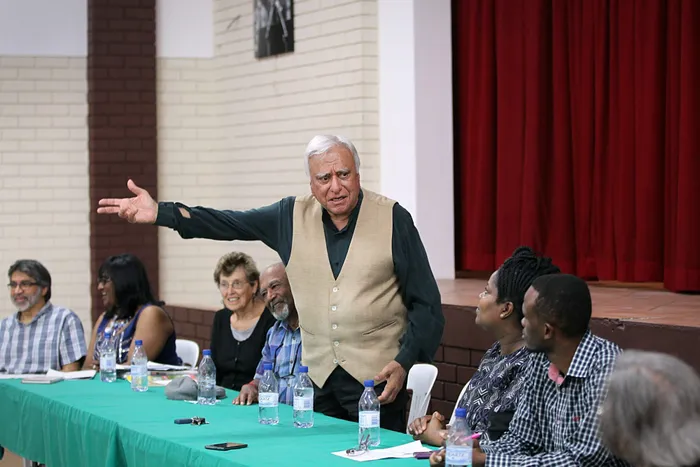A leader who spoke truth to power

Picture: Motshwari Mofokeng/October 16, 2016 – ANC member Prof Jerry Coovadia addresses the active citizen forum gathered at Asherville community hall.
Picture: Niamh Walsh-Vorster – The late Prof Hoosen Jerry Coovadia was a renowned anti-apartheid activist, a globally recognised scientist and an expert in the area of mother-to-child HIV and Aids prevention.
By Michael Sutcliffe
Prof Jerry Coovadia, for me, lived the belief that there is only one race, the human race and that we must fight all injustices, such as inequality, poverty, arrogance and the like. I first encountered him at the Medical School of the University of KwaZulu-Natal in the early 1980s, where he was one of few black academics. Our planning programme at the then-University of Natal was the only one in South Africa admitting black Master’s students.
From then onwards, he, Pravin Gordhan, Diliza Mji, Yunus Mahomed, Jabu Sithole and many other activists brought us into the Struggle in all sectors to create a non-racial, non-sexist, united and democratic country. It was also about working with trade union comrades like Boysie Dlamini, Alec Erwin in the Metal and Allied Workers Union, Jay Naidoo, Cyril Ramaphosa in the Council of Unions of South Africa, and so on, and in the mid-1980s Cosatu was born.

Hundreds of formations like Namda, Jorac, DHAC, Chess, BESG and others fought, not just out of a need for struggle but out of a need to develop where the apartheid regime and capitalism had underdeveloped our people. And operating like a true doctor, Coovadia helped keep the centre of the movement together.
Then, soon after the launch of the United Democratic Front (UDF) some 40 years ago, we decided to get the Joint Academic Staff Association of the University of Natal to affiliate with the UDF. Strenuous opposition from the white academics ensued, but in a meeting addressed by comrade Coovadia, we won the vote and affiliated, becoming the only academic staff association at any university to affiliate with the UDF.
In 1984, we then fought against the Tri-cameral elections, such as for the Indian House of Delegates. I remember being in our UDF/NIC control room on my Apple 64kb computer, documenting results as they came in from activists, being surrounded by giants like Coovadia, Gordhan and Farouk Meer. The work of all of the activists going door to door, engaging our people, led to a rejection of the Tri-cameral system, with voter turnout levels of less than 20 percent.
The mass mobilisation was only part of the Struggle against the apartheid state, with a need also to support the armed Struggle, build the underground and engage the ultra-left and the right wing to support international campaigns such as the academic boycott. In all this, Coovadia taught us to juggle the many balls that confronted us. He could switch in minutes from discussing political strategy to helping a student with a research problem to encouraging those in his orbit in his decent, honourable way.
He assisted and led comrades at the Medical School and other institutions in their academic, research and outreach work. The work was amazing, from health clinics to matric learning sessions to developing the Progressive Primary Health Care network across the province. And all this was done in an environment of having to deal with, among others, conservative white academics, and security forces every day of his life. Ironically, while by day, the white conservatives taught black medical students, by night, we would meet in the same offices, plotting strategies against apartheid.
Comrade Archie Gumede would catch a taxi there, and when I would drive him home to Clermont, I would often think of how terrible the apartheid social, economic and spatial reality was, that the likes of Gumede and Coovadia had no personal ambitions except to fight against racism, sexism, poverty and the like, and that spatial apartheid reality remained as a blight on our development as a society.
In all this, the apartheid regime did its level best to threaten, if not to kill, Coovadia and his family. While abroad in 1989, evil apartheid cowards bombed his house while Zubie and his children were inside. Thankfully, no one was killed, but this was one of the many lengths to which the brutal apartheid regime would go before the negotiations process began after 1990.
Our heart goes out to Coovadia’s amazing wife, Zubie, his family and the countless people lucky enough to have been touched by him. Coovadia’s work cannot be simply described or documented. He also cannot be compartmentalised – he excelled in everything he did, but he always had time to find out about people and things he did not know about. And that, for me, was his best quality; whoever reached out to him was changed by him.
He stood up for what was right and just, and as he lives on in us so let us take up his spear to speak truth to power wherever there may be injustice.
Dr Michael Sutcliffe is Director of City Insight